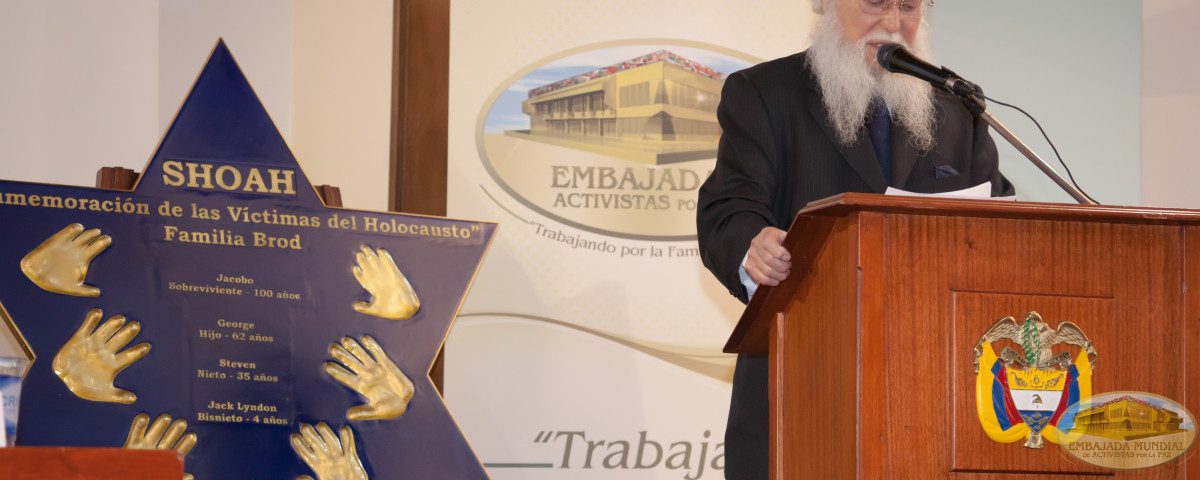
Dr. William Soto | SPEECH GIVEN AT THE CONGRESS OF THE REPUBLIC OF COLOLMBIA
Dr. Edgar Espíndola Niño, Second Vice President of the Senate; Yoed Magen, Israeli Ambassador to Colombia; Maciej Zietara, Polish Ambassador to Colombia; Jean-Claude Vandoorne, French Ambassador to Colombia; Gunnar Schneider, Head of Culture and Press of the German Embassy; Dr. Diana Wang; survivor Sigmund Halstuch; Rabbi Yoshua Rosenfeld, Director of Casa Lubavitch; diplomatic body accredited to Colombia; members of the Jewish community; ladies and gentlemen, good morning.
It’s an honor to be here today in the Congress of the Republic of Colombia, a country which has recently incorporated into its legislation a statute that is at the international forefront regarding the defense of fundamental rights and respect for human dignity, with the issuance of Act 1482 of 2011, or the Anti-Discrimination Act.
The work of the Congress of Colombia is outstanding, given that it has issued said Act in accordance with its constitutional mandates and the international law, which prohibit all forms of discrimination. The Act directly establishes the advocacy of genocide, among other behaviors, as a crime. This consists of “spreading ideas or doctrines that encourage, promote, or in any way justify genocide or antisemitism; or that intend to restore regimes or institutions that protect the practices of these doctrines.”
For this reason, the example set by Colombia with the Anti-Discrimination Act is truly remarkable and worthy to follow. Meanwhile, in Europe, far-right movements founded on xenophobia and the blaming of certain groups—usually a minority—for the bad economy, are gaining ground in countries such as Greece, Austria, and France.
Anyone who reads the history of Nazism will find that there was a process, there were phases or stages in the Nazi speeches that progressively led to the dehumanization of the Jews, resulting in the so-called “Final Solution.” At first, it was nothing but a jumble of populist, antisemitic remarks made for audiences at beer halls, a collection of lies and myths passed down from generation to generation, repeated without purpose or order. Later on, these rantings began taking shape, becoming a system that increasingly expressed—though still only verbally—an ancient hatred, blaming the poor state of the economy on the Jews, who were also blamed for participating in the supposed betrayal that caused Germany's defeat in World War I.
The speeches became more virulent and extremist. Jews were compared to disease-causing bacteria and many called for their extermination.
When the Nazis took power, they first took action by eliminating the opposition. What happened next was the genocide of millions of men, women and children. They were killed for being Gypsies, Communists, Jehovah's Witnesses, and, as was the case for most of them, for being Jews.
What began with demagogic speeches in the taverns of Münich, led directly to the fearsome crematoriums of Auschwitz and Treblinka.
But what we observe with concern at the Global Embassy of Activists for Peace, is that young generations are almost completely unaware of the events that led to the Holocaust, while the voices that deny the holocaust are spreading throughout the media, like that of the current president of Iran.
This is why we feel that the issuance of this Anti-Discrimination Act on behalf of the Colombian Congress is so exemplary, as it prohibits the discriminatory behaviors from which outbreaks of racist and xenophobic violence originate, which worryingly, are also spreading throughout some countries in our region of Latin America.
The honorable legislators of Colombia are being loyal to their obligation to issue just laws that seek peace, harmony, well-being, and prosperity of their fellow citizens. Acts like Act 1482 of 2011, or the Anti-Discrimination Act, will become bastions against discrimination, hatred, and violence.
Our campaign, Traces to Remember, is also a way to create opportunities for reflection—particularly among youth—regarding the events and consequences of the Holocaust, because as the Secretary General of the United Nations stated after the approval of Resolution 60/7, which designated January 27 the annual International Day of Commemoration in Memory of the Victims of the Holocaust, this is “an important reminder of the universal lessons of the Holocaust, a unique evil which cannot simply be consigned to the past and forgotten.”
Furthermore, there is another powerful and important tool to achieve this goal, which is education. For it is through education that we can truly, as human beings, learn the lessons of history and prevent indifference from being a normal, everyday attitude in the face of violations against fundamental rights. May the Paraguayan people rise up in defense of human rights, upon the threat of a similar atrocity against any group of people, whether it be for reasons of religion, culture, or nationality. May the Paraguayan people be the leader of peace, harmony, and concord among nations.
To achieve this goal I would like to propose to the esteemed congressmen here today, with the utmost respect, that through a law of Congress, the Holocaust be included as a subject of study and debate in the last years of high school, and as a course of study or a case study in universities. May we transform the darkest chapter, the dark stain on the page of humanity’s existence into the most powerful mechanism of reflection and protection for the value of the right to life and human dignity.
This idea has already been endorsed by the Ministry of Education and Culture of Paraguay through Resolution 684 of February 20, 2013, which adopted this initiative and declared the project Traces to Remember of educational interest.
If this proposal is welcome among you, I offer all the assistance that the Global Embassy of Activists for Peace can provide.
Thank you very much, and congratulations again to the Congress of Colombia.